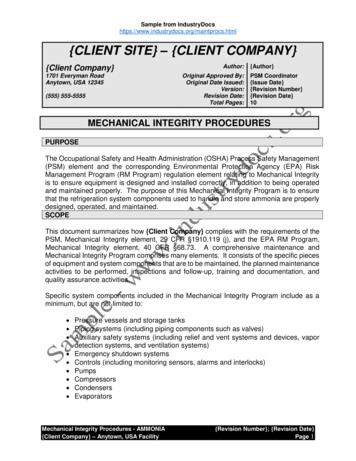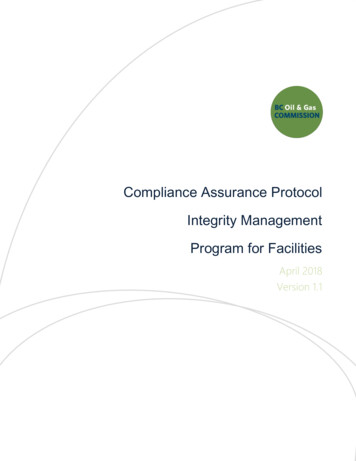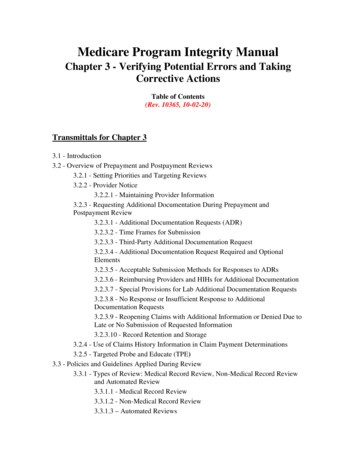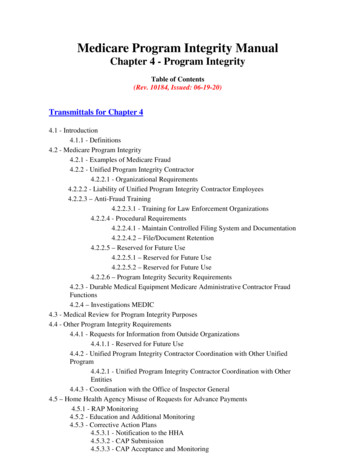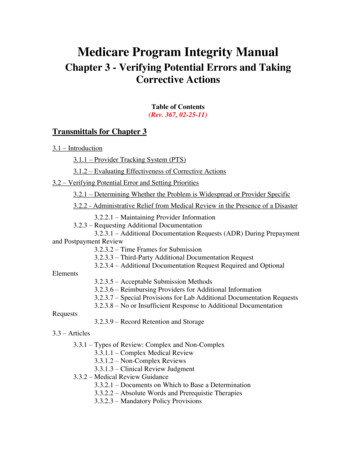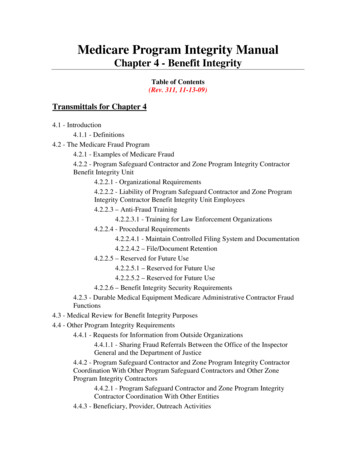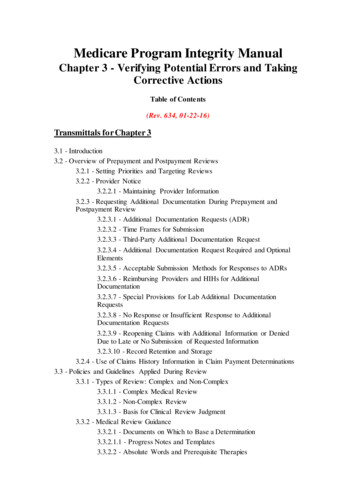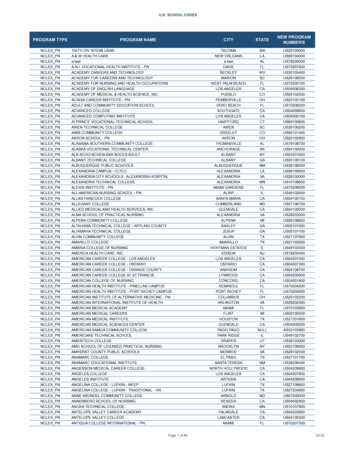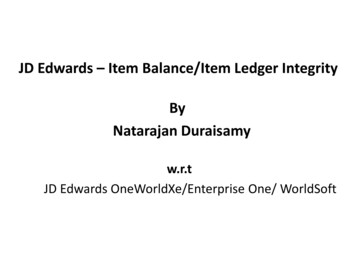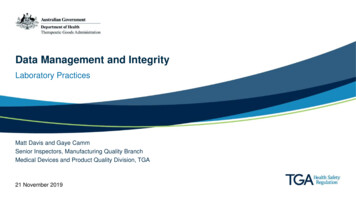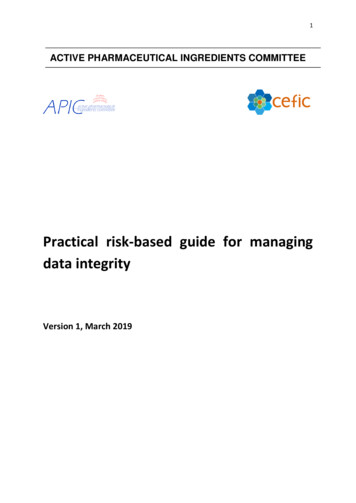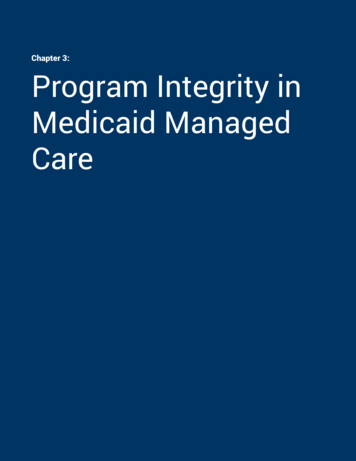
Transcription
Chapter 3:Program Integrity inMedicaid ManagedCare
Chapter 3: Program Integrity in Medicaid Managed CareProgram Integrity in Medicaid Managed CareKey Points Program integrity consists of initiatives to detect and deter fraud, waste, and abuse as well asroutine oversight to ensure compliance with state and federal law. These activities are meantto ensure that taxpayer dollars are spent appropriately on delivering accessible, high-quality,and necessary care.Comprehensive managed care is now the primary Medicaid delivery system, accounting fornearly half of federal and state spending on Medicaid and about 60 percent of beneficiariesin 2015. However, managed care program integrity issues have not traditionally received thesame focus as those in fee for service.States require that Medicaid managed care organizations (MCOs) proactively minimize fraud,waste, and abuse. Risk-based payments also create financial incentives for MCOs to minimizeimproper payments.There is considerable variation among states in program integrity requirements for MedicaidMCOs, state oversight of MCO program integrity activities, and the extent to which states andMCOs work together to reduce fraud, waste, and abuse.While many program integrity practices are perceived to be effective, there are fewmechanisms for measuring return on investment or for sharing best practices. In addition,there is a need for greater coordination among state staff assigned to managed care andprogram integrity functions as well as better data on managed care encounters.Federal regulations for Medicaid managed care were updated in 2016, including more detailedprovisions relating to program oversight and program integrity. Many stakeholders believethe changes will strengthen managed care program integrity and lead to greater consistencyacross states. However, the Centers for Medicare & Medicaid Services is still in the process ofdeveloping guidance and implementing major portions of the rule, so it is too early to assessthe complete effects of the new rule.Looking ahead, the Commission may examine other areas of program integrity in managedcare, such as:–– how states validate their encounter data for future rate setting;–– incentives for MCOs to make investments in prepayment auditing;–– mechanisms for sharing provider screening data among states and programs; and–– how to measure the effectiveness and impact of program-related activities and bestpractices. 100The Commission may also consider how well current program integrity rules apply to newvalue-based purchasing models, particularly the use of accountable care organizations andmanaged long-term services and supports plans.June 2017
Chapter 3: Program Integrity in Medicaid Managed CareCHAPTER 3: ProgramIntegrity in MedicaidManaged CareFrom its earliest reports, MACPAC has focusedrepeatedly on program integrity in Medicaid and theState Children’s Health Insurance Program (CHIP).1As described in previous Commission reports,program integrity activities are meant to ensurethat taxpayer dollars are spent appropriately ondelivering accessible, high-quality, and necessarycare and preventing fraud, waste, and abuse (Box3-1). The Commission also previously identifiedchallenges associated with the implementation ofan effective and efficient Medicaid program integritystrategy (MACPAC 2013, 2012). These challengesinclude insufficient collaboration and informationsharing among various oversight entities and fewfederal program integrity resources for deliverymodels other than fee for service (FFS).BOX 3-1. Fraud, Waste, Abuse, and Managed Care OversightProgram integrity consists of initiatives to detect and deter fraud, waste, and abuse as well asroutine program oversight to ensure compliance with state and federal regulations. These activitiesare meant to ensure that taxpayer dollars are spent appropriately on delivering accessible, highquality, and necessary care.Medicaid regulations define fraud and abuse in the same way for fee for service and managed care(42 CFR 455.2).Fraud is an intentional act of deception or misrepresentation made with the knowledge that thedeception could result in some unauthorized benefit to the person committing the act or someother person. It includes any act that constitutes fraud under applicable federal or state law.Abuse comprises provider practices that are inconsistent with sound fiscal, business, or medicalpractices and result in an unnecessary cost to the Medicaid program or in payment for servicesthat are not medically necessary or that fail to meet professionally recognized standards for healthcare. For example, a dentist might recommend a root canal and crown when standards of dentalpractice would indicate that a filling is appropriate. It also includes beneficiary practices that resultin unnecessary cost to the Medicaid program.Medicaid regulations do not define waste, but it is generally understood to include the misuseof resources (not caused by criminally negligent actions) that directly or indirectly results inunnecessary costs to the Medicaid program, such as requesting duplicate laboratory tests orimaging.Managed care oversight consists of minimum contracting standards and oversight responsibilitiesplaced on states that contract with managed care plans to provide Medicaid services on a permember per month basis (42 CFR 438). States are responsible for exercising general oversight overtheir plans’ compliance with their contracts and adherence to federal and state laws, regulations,and policies, including when fraud or abuse is suspected. States establish additional oversight andmonitoring of quality, access, and timeliness of care for managed care enrollees. Managed careoversight also focuses on administration and management, appeal and grievance systems, claimsmanagement, customer service, finance, information systems, marketing, medical management,provider networks, and quality improvement.Report to Congress on Medicaid and CHIP101
Chapter 3: Program Integrity in Medicaid Managed CareTraditionally, Medicaid program integrity activitieswere designed with the assumption that stateswould enroll and pay providers directly forindividual services—for example, that stateswould check national databases to ensure that aprovider excluded from participation in Medicarewas also excluded from Medicaid—and that theywould implement prepayment edits and audits inthe claims adjudication process to help identifyand suspend potentially improper payments. Butover time the program’s structure has changeddramatically, and now managed care is the primaryMedicaid delivery system in 29 states. Nearlyhalf of federal and state spending on Medicaidin 2015—over 230 billion—was on managedcare, and the proportion continues to grow eachyear (MACPAC 2016a).2 This shift has importantconsequences for strategies to ensure programintegrity.While both the federal and state agencies thatoversee Medicaid remain statutorily responsiblefor ensuring program integrity, the nature oftheir efforts change when Medicaid services areprovided through a managed care delivery systeminstead of FFS. In FFS, the state is responsiblefor contracting with providers, processing claims,managing utilization, and paying providers and istherefore best positioned to monitor for providerfraud, waste, and abuse. In managed care, theseresponsibilities are contracted to a managed careorganization (MCO), which assumes responsibilityfor monitoring for false or improper claimssubmission by providers and other types of fraudand abuse.It is important to note, however, that althoughMCOs are given primary responsibility foroversight of their providers and claim payments,states cannot delegate their federally mandatedresponsibility to ensure appropriate payment,access, and quality. Thus, states must assumebroader program oversight responsibility—ensuring that capitation payments are appropriate,validating that MCOs have adequate providernetworks, and providing oversight of MCOadministrative requirements. Correspondingly,102the Centers for Medicare & Medicaid Services(CMS), the federal agency that administers theMedicaid program, must ensure that states provideappropriate oversight of contracted managed careplans and comply with federal requirements.Earlier MACPAC reports on program integrityfocused on state and federal initiatives to detectprovider fraud and eligibility errors, the twoareas of concern that have been most frequentlyaddressed in legislation and rulemaking (MACPAC2013, 2012). In those early reports, noting thatstates were increasingly enrolling beneficiariesinto MCOs, MACPAC highlighted the importanceof identifying the program integrity challenges andopportunities relating to managed care. In May2016, CMS published updated federal regulationsfor Medicaid managed care, which included moredetailed provisions relating to program oversightand program integrity.3 This update provided theimpetus for the Commission to move ahead withan examination of managed care program integrity,focusing on initiatives to detect and deter fraud,waste, and abuse. The broader program oversightaspects of managed care program integrityactivities may be the subject of future Commissionwork.Over the past year, the Commission undertook anin-depth examination of state, federal, and MCOprogram integrity activities to assess the scopeof current activities, their perceived effectiveness,and the anticipated effects of regulatory changes,including the degree to which the new ruleaddresses the Commission’s earlier concerns.This examination included an environmental scanof managed care program integrity policies andinterviews between July and October 2016 with10 states, 3 MCOs, and several federal agencies,including the Center for Medicaid and CHIPServices (CMCS), the Center for Program Integrity(CPI), and the Center for Medicare (all within CMS)as well as the Office of the Inspector General (OIG)of the U.S. Department of Health and HumanServices (HHS). The Commission also heard from apanel of federal and state experts at its December2016 public meeting.June 2017
Chapter 3: Program Integrity in Medicaid Managed CareThis study found the following: While the prevalence of managed care hasgrown over the last 15 years, making it a majorMedicaid delivery system today, only recentlyhave managed care program integrity issuesreceived the same amount of focus at thestate and federal level as program integrity inFFS.There is considerable variation among statesin program integrity requirements for MedicaidMCOs, state oversight of MCO programintegrity activities, and the extent to whichstates and MCOs work together to reducefraud, waste, and abuse.Many program integrity practices areperceived by states and MCOs to beeffective, but states have few mechanismsfor measuring the return on investment ofprogram integrity activities or for sharing bestpractices.Most states and plans interviewed forthis study commented that the updatedregulations, which incorporate many priorrecommendations made by federal oversightagencies and adapt practices from leadingstates, are likely to strengthen managed careprogram integrity (Appendix 3A).States indicated they are already operatinglargely in compliance with some provisionsin the new rule, while other provisions willrequire them to make substantial operationalchanges.CMS is still in the process of developingsubregulatory guidance to assist statesand MCOs in complying with the updatedprogram integrity provisions, and states arestill in the process of assessing the new rule,implementing changes where necessary whileawaiting additional guidance from CMS. It istoo early to assess the complete effect of thenew rule.Report to Congress on Medicaid and CHIPWe begin this chapter with a description of theprogram integrity issues in managed care andhow these are similar to or different from those inFFS Medicaid, which we follow with summariesof the program integrity responsibilities of CMS,states, and MCOs. We then report the findings ofour research, particularly regarding the strengthsand weaknesses associated with existing programintegrity measures, whether there are additional oralternative steps the federal government could taketo ensure program integrity in Medicaid managedcare, and the degree to which the new managedcare rule is likely to strengthen state and federaloversight. We conclude the chapter with a briefdiscussion of issues that the Commission mayexamine in the future.Program Integrity in ManagedCareComprehensive managed care is now the primaryMedicaid delivery system in 29 states, accountingfor nearly half of federal and state spending onMedicaid and about 60 percent of beneficiaries in2015 (MACPAC 2016a, 2016b). States vary in howthey have designed and implemented Medicaidmanaged care programs, including the populationsenrolled, the roles and responsibilities assignedto MCOs, the level of oversight and managementretained at the state level, and the maturity oftheir programs. In a comprehensive managed careprogram, states contract with MCOs to deliver all ormost Medicaid-covered services for plan enrollees.MCOs are paid a capitation rate—a fixed dollaramount per member per month—to cover a definedset of services for each enrolled member, andthey must contract with a network of providers todeliver these services. The capitation rates must bedeveloped in accordance with generally acceptedactuarial principles and practices, they must beappropriate for the enrolled population and theservices covered in the contract between the stateand MCO, and they must be certified by qualifiedactuaries. MCOs are at financial risk if spending103
Chapter 3: Program Integrity in Medicaid Managed Careon benefits and administration exceeds payments;conversely, they are permitted to retain any portionof payments not expended for covered servicesand other contractually required activities.The primary differences between FFS and managedcare delivery systems—in particular the paymentand contracting arrangements—create new ordifferent kinds of program integrity risks thatrequire program-specific safeguards (Table 3-1).For example, under a managed care contract, thestate delegates provider contracting, utilizationmanagement, and claims processing to an MCO.This means that the MCO, not the state, is primarilyresponsible for making sure that payments areaccurate and that sufficient data are collectedfor oversight. State responsibilities must adaptto include oversight of and payment to plans; forexample, to make sure capitation payments areappropriate and that encounter and enrollmentdata are accurate and valid.TABLE 3-1. Characteristics of Fee-for-Service and Managed Care Delivery Systems and ProgramIntegrity Risks Specific to Managed CareFee-for-servicecharacteristicsManaged carecharacteristicsState paysproviders forservicesState pays MCO acapitated paymentState processesclaimsMCO processesclaimsProgram integrity risks specific tomanaged care delivery systems Underutilization of services by MCO enrollees Inaccurate encounter (claims) data submitted by MCO State overseesindividualproviders andcontractsState overseesMCO contract;MCO cansubcontractState paysproviders on a feefor-service basisMCO cansubcapitateproviders or useother incentivesState coversall MedicaidbeneficiariesMCO coversonly assignedor enrolledbeneficiariesState contractswith all qualifiedprovidersMCO contractswith a selectprovider networkIncorrect or inappropriate capitation rate setting for MCOpayments Failure of MCO staff to cooperate with state investigationsand prosecutions of fraudulent claimsFocus on cost avoidance, not recoupment of state dollarsMCO submits incomplete or inaccurate information oncontract performanceLack of access to subcontractor information on contractperformance or falsification of information Underutilization by MCO enrollees Inappropriate physician incentive plans Payment to MCOs for non-enrolled individuals Marketing or enrollment fraud by MCO Lack of adequate MCO provider network MCO must choose between removing risky providers andmaintaining network adequacyLack of communication results in a disqualified providerterminated from one MCO being hired by another MCONote: MCO is managed care organization.Source: MACPAC, 2017, review of Title XIX of the Social Security Act and 42 CFR 435–460.104June 2017
Chapter 3: Program Integrity in Medicaid Managed CareMCOs carry the financial risk associated withcapitated payment arrangements, meaningthat they are at risk for any losses if the costsassociated with covering Medicaid enrolleesexceed the capitation payments received from thestate. Therefore, the traditional assumption hasbeen that MCOs have an incentive to proactivelyreduce fraud, waste, and abuse to minimizeavoidable losses. But the various approachesMCOs use to avoid or recover improper claimpayments (e.g., purchasing claims-editing softwareand hiring investigators) have costs, and there islittle information on which program integrity effortsconsistently generate positive returns.Moreover, other financial considerations caninfluence MCO decisions about the amount andtype of investments they make in ensuring programintegrity. For example, although recoveries offraudulent payments can be easily quantified, theamounts potentially saved through cost avoidanceactivities are harder to estimate. If a state’scontract with a Medicaid MCO links incentives orpenalties to recoveries but not to cost avoidance,then the MCO might invest more resources inpostpayment fraud detection activities and less inupfront fraud prevention. Medicaid MCOs are alsorequired to report annually their medical loss ratio(the proportion of the Medicaid capitation spenton claims and activities that improve health carequality) and are expected to achieve a medical lossratio of at least 85 percent.4 Expenses for fraudreduction activities are not counted toward themedical loss and are considered administrativecosts, along with other MCO administrativeexpenses and financial margins, which might causeMCOs to limit the amounts they spend on programintegrity activities.Although states may not delegate their federallymandated responsibilities to MCOs, they maydelegate day-to-day responsibility for oversight ofnetwork providers. Prior to 2016, there were fewfederal rules that specifically addressed managedcare program integrity and there was substantialvariation among states in their requirements forReport to Congress on Medicaid and CHIPMCOs and their oversight activities. For example,before 2016, federal regulations on programintegrity for Medicaid managed care requiredMCOs to certify the accuracy of data submitted tothe state, including encounter data submitted bynetwork providers, and prohibited health plans fromcontracting with providers who had been debarredby federal agencies, including the Medicareprogram. Federal rules also required Medicaidhealth plans to have a written fraud and abuseplan that included, at minimum, a description ofcompliance oversight, training, and education forMCO staff as well as communication standards,disciplinary guidelines, internal monitoring, andcorrective action plans.As the proportion of Medicaid spending that flowsthrough managed care contracts has increased,states and the federal government have soughtto strengthen the oversight of managed careplans and to ensure that MCOs are conducting afull range of program integrity activities. In 2016,CMS updated the federal rule, thereby expandingthe federal oversight role, standardizing theexpectations for states across all managed careauthorities, and updating program standards toreflect the current scope of Medicaid managed careprograms (42 CFR 438). Subpart H of the new rulefocuses specifically on program integrity: it adaptsprovisions from FFS, addresses vulnerabilitiesidentified by oversight agencies including theU.S. Government Accountability Office (GAO) andthe OIG, and implements best practices used
program integrity functions as well as better data on managed care encounters. Federal regulations for Medicaid managed care were updated in 2016, including more detailed provisions relating to program oversight and program integrity. Many stakeholders believe the changes will strengthen managed care
